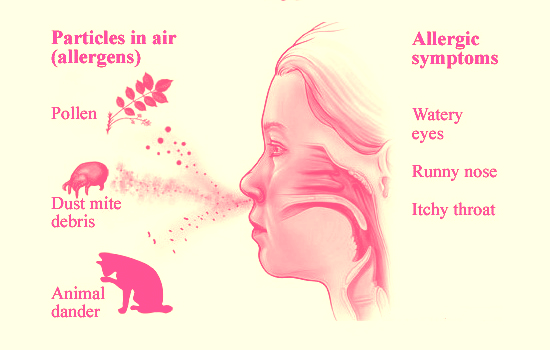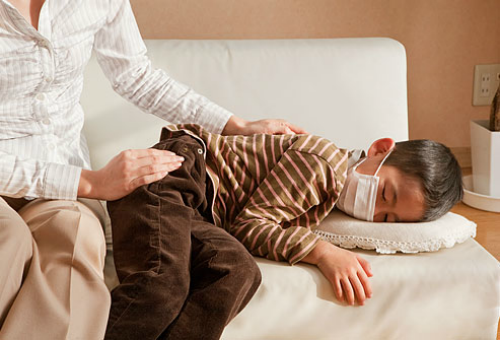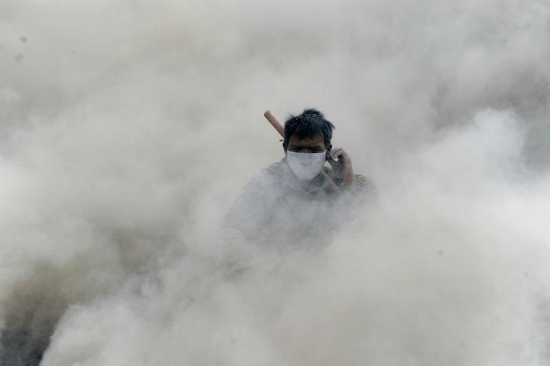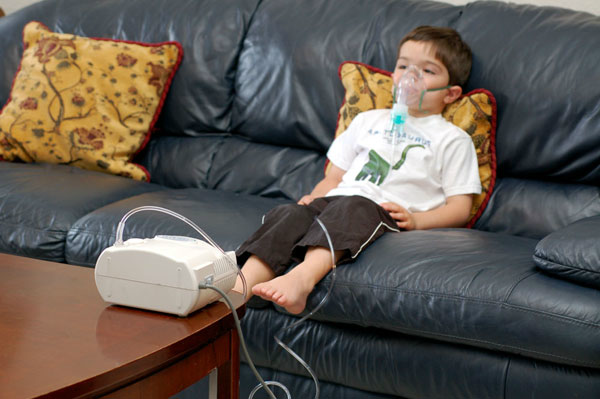Asthma is a chronic respiratory inflammation condition of the airways which is typified by reversible and recurrent obstruction of the airways leading to hyperreactivity. While adult-onset asthma is common, the condition could occur at any given age – most commonly under 40 years.
Asthma Causes or Risk Factors
The aspects that make a person asthmatic are debatable, as they are yet not evidently understood by the biological scientists. But, it is clear that the chronic inflammatory disease of the airways is an outcome of complex reactions between the patient’s genetic makeup inherited from parents and its correspondence with the environment.
Having said that, the following are studied to be the frontline risk factors:
- History of allergic rhinitis or hay fever
- Contact with cigarette smoke or passive smoking
- Excess body fat
- History of allergic conditions
- Poor socioeconomic grade
- History of respiratory syncytial virus (RSV) and other viral respiratory diseases

Asthma Triggers
Asthma has a lot to do with the airways which become narrow, resistant, inflamed, and congested with mucus when they come in contact with asthma triggers. It’s important to know specific triggers to avoid asthma attacks and dodge the symptoms from getting worse.
Here are a few triggers listed that react with the sensitive airways of the asthmatics:
- Dust mites, mold spores, pollens, pet dander, and other allergens
- Tobacco smoke
- Flu, cold, sinusitis, and other infections
- Weather transformations: cold air, humidity, etc.
- Air pollution, persisting scents from cleaning agents or perfumes and other irritants
- Certain medications such as aspirin
- Stress or tough emotions like depression, anxiety, extreme happiness, etc.
Asthma Signs & Symptoms
Know that not all asthmatic patients show the same symptoms. Having foreknowledge of the signs will help to control asthma attacks. The condition is usually signalized by tightening or inflammation of the bronchial tubes followed by augmented manufacture of sticky secretions or mucus in them.
Classic symptoms
- Heaviness of the chest, chest pain, or chest tightness
- Wheezing
- Coughing (during night)
- Breathlessness
Asthma attack symptoms
- Blue fingernails or lips
- Extreme rapid breathing
- Heavy wheezing while breathing
- Sweating
- Pale face
- Unstoppable coughing
- Panic attack/anxiety
- Pressure on chest
- Difficulty in speaking
- Retraction
Early symptoms
- Sleeping difficulty
- Feeling upset or moody
- Tiredness
- Persistent cough
- Runny nose, sneezing, sore throat, and other signs of cold
- Shortness of breath
- Abnormalities in lung functioning
- Wheezing after exercising
Uncommon symptoms
- Sleep apnea
- Sighing
- Chronic cough with “no” wheezing
- Fatigue
- No concentration
- Unable to exercise appropriately
Asthma Types
Over the years, the experts have struggled to define the causes of asthma; however, they have very well been successful in defining its different types to help find the right and effective treatment for each of them.
1. Exercise-Induced
As pronounced, this type is triggered as a result of lengthened or forceful physical exercise. People suffering from it experience the narrowing of airways due to the sensitive nature of surrounding muscle bands. It is surprising to find out that some people ‘without’ chronic asthma still experience the symptoms of exercise-induced type while exercising.
2. Nocturnal or Nighttime
Asthma is naturally influenced or stimulated by circadian rhythms or sleep-wake cycle. That’s why, most asthmatic deaths have occurred at night based on reasons varying from postnasal drip to reclining position to cooling of the airways. Trouble breathing and wheezing are the commonly observed symptoms.
3. Allergic
It stands as the most common type of chronic allergic condition where allergy symptoms are triggered by the release of histamines by the immune system as a response to increased sensitivity to certain substances. Patients often experience weepy eyes, scratchy throat, and swollen nasal passages.
4. Occupational
Call it workplace fear or any other thing, people with this type of asthma experience difficulty breathing, eye irritation, nose congestion, and other symptoms only while on the job. Woodworkers, animal breeders, painters, etc., are common victims of this type.
5. Cough-Variant
A predominant sign of this type is severe, persistent coughing due to sinusitis with asthma. Lung function test is preferably ordered by the doctor during diagnosis. This undertreated and underdiagnosed asthma is generally triggered by exercise and respiratory infections.
Asthma Drugs
For long term control and short term relief, it is significant to know the different medications and drugs used against asthma. You can save the life of your loved one and help him live an energetic life despite the disease.
1. Nebulizer
It is a substitute for inhalers for those who struggle using inhalers with spaces or small inhalers. Older adults and children are primary users of asthma nebulizer which helps to inhale the medications directly into the lungs as it changes them from liquid form to a mist.
2. Inhaler
Available in different forms, inhalers are most effectively and commonly used to direct asthma drugs into the lungs. Used in different techniques, some inhalers are even capable of directing more than one drug into the patient’s lungs. Dry powder inhalers (DPIs) and metered dose inhalers (MDIs) are primarily prescribed by the doctors. These come with fewer side effects and help to deliver the drugs faster.
3. Medications
Bronchodilators are used to release the airway passages of asthmatic patients. The long-acting ones are used on a daily basis along with an inhaled steroid to keep asthma under control while the short-acting ones are relied upon as rescue or quick relief medication. Anti-inflammatory drugs and steroids, on the other side, act as lifesaving medications which make the airways less sensitive to asthma triggers and prevent asthma attacks.
Asthma Stimulators
It’s vital that you look for help even if your body begins to show small symptoms of asthma. Living with them can be dangerous as they could take a vicious avatar in the future.
1. Anxiety
Serious coughing, wheezing, sweating, or other symptoms could make you anxious and further worsen the case for you. Asthma and anxiety together make a malicious bond; therefore, it is necessary that you seek help from a professional counselor to eliminate your anxiety and keep asthma under control.
2. Stress
Your response to stress in your day-to-day life is important to tackle asthma attacks. Though stress does not cause asthma, it could very well make it difficult to control the condition.
3. Smoking
Needless to say that smoking is the No.1 trigger of asthma. Smoking and asthma cannot go hand-in-hand in any way. You cannot expect your asthma inhalers to work for you while you’re inhaling nicotine!

















Thanks…its very important things for me…im also asthma patient
very useful information!
Is this place in Canada? I think I have asthma
Asthma spread person to person this is correct
I don’t know asthma spread person to person?